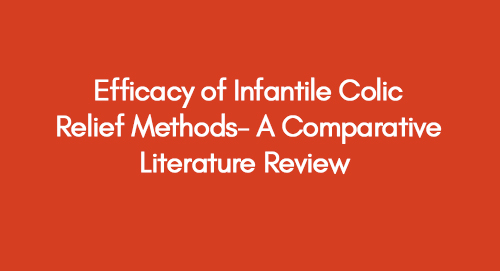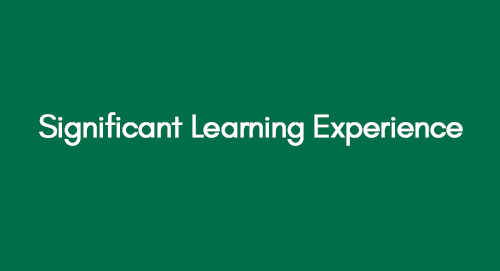
Efficacy of Traditional Methods of Infantile Colic Relief
June 3, 2022
Safety Culture in Maritime Industry: A Case Study of Nigeria
June 4, 2022Healthcare, as an ever-evolving field, presents a plethora of learning experiences that not only shape the professionals within it but also redefine the way we understand and approach wellness and treatment. In the intricate tapestry of healthcare, each encounter, each challenge, and each success contributes to a continuous journey of learning and growth. Reflecting on my journey, I am reminded of several significant learning experiences that have deeply impacted my understanding of healthcare and the role of healthcare professionals in society.
Learn More About Significant Learning Experience in Healthcare
One of the most profound lessons I've learned in healthcare is the importance of empathy. It's more than just understanding a patient's medical condition; it's about grasping their fears, hopes, and dreams. One particular experience stands out: a terminally ill patient who taught me that sometimes, the most powerful medicine we can offer is a compassionate presence. Witnessing the impact of empathy on both patient and practitioner has taught me that healing encompasses more than just treating physical symptoms—it involves nurturing the human spirit.
In anticipation of exploring Significant Learning Experiences in Healthcare, let's delve into the intricacies of this dynamic field. Reflecting on its profound impact, we uncover transformative insights that shape our understanding and practice in healthcare.
Introduction
This assignment offers a thorough exploration of how healthcare professionals encounter significant learning experiences. The following literature is grounded in my reflection on interactions with a specific patient, illuminating how it initiated my learning journey as a medical professional. Additionally, it addresses areas of improvement and actions necessary during significant learning to mitigate uncertainty in future experiences.
Preceding the discussion on Gibbs's Reflective Cycle, let's delve into its framework for introspection and growth.
Gibbs Reflective Cycle
Gibbs Reflective Cycle is a structured framework used for thoughtful analysis of experiences, featuring six stages: description, feelings, evaluation, analysis, conclusion, and action plan. It enables individuals in healthcare to gain insights, identify areas for improvement, and enhance professional practice.
Description
Being a radiotherapy student on placement, I was supposed to have a radiotherapy pre-treatment chat session with a patient diagnosed with cancer. Like any other patient coming for a CT scan before radiotherapy, to whom I had to give a first-day chat, I had to think about who the patient could be, what would be their level of perception, and how I had to express myself. It was a challenge to stay prepared for any consequences and how adequately I should react to the possible situations.
Feelings
I introduced myself and then started investigating patients' identities as required by the department protocol. Any examination or treatment regime in radiotherapy is unique to the individual, therefore, the patient needs to be identified before any treatment procedure (The Royal College of Radiologists et al, 2008). When I started explaining the process and reason for a CT scan, I realized the patient was showing signs of unawareness about their radiotherapy cancer treatment and was also emotionally unsettled for he was not educated by any healthcare professional regarding the nature of radiotherapy treatment and how it performed. In my, opinion, this was the phase where my significant learning process was initiated. It was clear that even after being diagnosed with cancer and recommended radiotherapy for the treatment, the patient was visiting the radiotherapy department for the first time. Therefore, it was important for me to build trust with the patient to make the make them feel more comfortable and reassured; for the diagnosis of cancer would be a shock to individuals who would feel frightened and anxious whereas actions of uncertainty are presumed to be normal in such case (Macmillan Cancer Support, 2017).
Nevertheless, I informed my supervisor regarding the situation, who immediately visited the scene and directly interacted with the patient. The patient on the other hand still claimed not to remember any instructions given after their diagnosis. He then recalled to the patient the meeting they had with the consultant and radiotherapy recommended for treating their disease then instructed me to continue with the explanation of the CT scan process after which we performed the scan. Initially, with the patient reacting absurdly I felt unsure of what I should do and say, but it was after my supervisor came and handled the situation that I felt a little relaxed. Regardless, after the scan took place I went to my supervisor to show my concern, upon which he reassured me that all information was computed to the patient but they sometimes are unable to retain it for different reasons.
Evaluation
Initially, I was quite confident in my empathetic skills as a medical student, however, I was surprised by my reaction during this incident. As I was able to acknowledge the gaps in my rapport-building skills, I presumed this incident was a challenging moment for me as a medical student. I was also uncertain about how to respond and did not feel experienced enough to deal with the situation alone. However, I was very careful with any verbal and non-verbal signs I showed because it was essential to effectively communicate with the patient as first impressions significantly impact the success of further communication (Skills You Need, 2014). Despite being in a staggered stage, I could still understand why some patients may easily forget about some information they receive regarding their diagnosis. Moreover, I was unable to immediately evaluate how to handle a sudden visit of an unaware and anxious patient to the radiotherapy department for an appointment, especially for a radiotherapy pre-treatment CT scan.
My level of anxiety increased more when my supervisor joined us while I was wondering if he would decide to remain silent and ask me to continue the conversation which I was struggling to intervene at that moment. I think I should have acted quickly and in the same way, as my supervisor did during the situation so that it could have been effectively dealt with. Considering the situation, it was necessary that the anxiousness and uncertainty of the patient must be immediately answered, or else they may feel left out. The patient may assume that no interest is given to their perceptions, which may reduce their confidence to propose their decisions during treatment and medical care (Ramlaul and Vosper, 2013). Looking back, this experience had good and bad elements which have led to an increased understanding of my role within the radiotherapy team, which could be considered as significant learning that I experienced during this incident. I had to give more attention, evaluate the situation and provide more explanations. However, I feel that I did not accomplish the task (O’Daniel and Rosenstein, 2008).
Review the Following:
From this experience, I acknowledged the significance of being self-assured and how to demonstrate professional skills in medical practice if a similar situation occurs in the future. Moreover, another significant learning during my experience was not to be over-confident in my studies and not consider the importance of practice in the medical profession. The understanding I have gained from this experience implies that I must be more mindful of the implications of being proactive and the criticality of considering the best interest of the patient. Nevertheless, a detailed study on similar cases and how patients react in different settings would have helped in a better understanding.
Conclusion
Most patients feel alarmed when informed of a cancer diagnosis and this may bring huge nervousness and impact their daily life posing difficulties to healthcare. This point is further supported by Williams et al (2017) who identified that an absence of information about radiotherapy procedures can increase anxiety among patients which may further increase at the commencement of treatment. Despite these difficulties, one of the imperative tools that will provide quality healthcare and an opportunity for medical professionals to comprehensively understand how to deal with patients during their diagnosis and treatment is communication. Communication, on the other hand, can be challenging to healthcare professionals and patients, but if it is effective, patient satisfaction will be enhanced resulting in superior cancer care (McCaffrey, 2011, p.121). What I could have done better was to have gone through some literature on dealing with possible situations while examining similar cases that have taken place in the past.
Action Plan
It was therefore imperative to know and consider such frequently occurring incidents so they could be managed in a much better way. Insights of patients’ reactions and cases on how differently they may react in different situations would have helped me handle this particular case better. This is a fact, that although practically experiencing such cases would add to my significant learning and pre-existing knowledge a theoretical understanding of previous cases would have still assisted. To improve for the next time, I would gather ample insights into how and where things may lead, and what effective measures could be adopted.
Conclusion
The assignment concentrates on the learning outcomes derived from a specific scenario. It also highlights the shortcomings and inefficiencies present, along with proposed measures to prevent such occurrences in the future. It underscores the importance of reviewing past cases as a proactive measure to mitigate uncertain circumstances.
References
Institute for Healthcare Communication (2014). Impact of Communication in Healthcare. Available from: http://healthcarecomm.org/about-us/impact-of-communication-in-healthcare. [Accessed 18 November 2017].
Macmillan Cancer Support (2017) Cancer and your feelings - Information and support. Available from: http://www.macmillan.org.uk/information-and-support/coping/your-emotions/dealing-with-your-emotions/cancer-and-your-feelings.html. [Accessed 15 November 2017].
McCaffrey RG. (2011). An educational program to promote positive communication and collaboration between nurses and medical staff. J Nurses Staff Dev.121-127.
National Cancer Institute (2014) Communication in Cancer Care. Available from: https://www.cancer.gov/about-cancer/coping/adjusting-to-cancer/communication-pdq. [Accessed 18 November 2017]
O’Daniel, M. and Rosenstein, A., H. (2008) Professional Communication and Team Collaboration. Available from: http://www.ncbi.nlm.nih.gov/books/NBK2637. [Accessed on 18 November 2017].
Ramlaul, A. and Vosper, V. (2013) Patient-Centered Care in Medical Imaging and Radiotherapy. E-Book. revised. Elsevier Health Sciences, ISBN 0702055239, 9780702055232
SkillsYouNeed (2014) What is communication? Available from: http://www.skillsyouneed.com/general/what-is-communication.html. [Accessed1 December 2017].
The Royal College of Radiologists, Society and College of Radiographers, Institute of Physics and Engineering in Medicine, British Institute of Radiology and National Patient Safety Agency (2008) Towards safer Radiotherapy. Available from: https://www.rcr.ac.uk/publication/towards-safer-radiotherapy. [Accessed 27 October 2017].
Williams, K., Blencowe, J., Ind, M., and Willis, D. (2017). Meeting radiation therapy patients’ informational needs through educational videos augmented by 3D visualisation software. Journal of Medical Radiation Sciences, 64(1), 35–40. [Accessed 20 November 2017].
Get 3+ Free Dissertation Topics within 24 hours?


















 Download PDF File
Download PDF File







